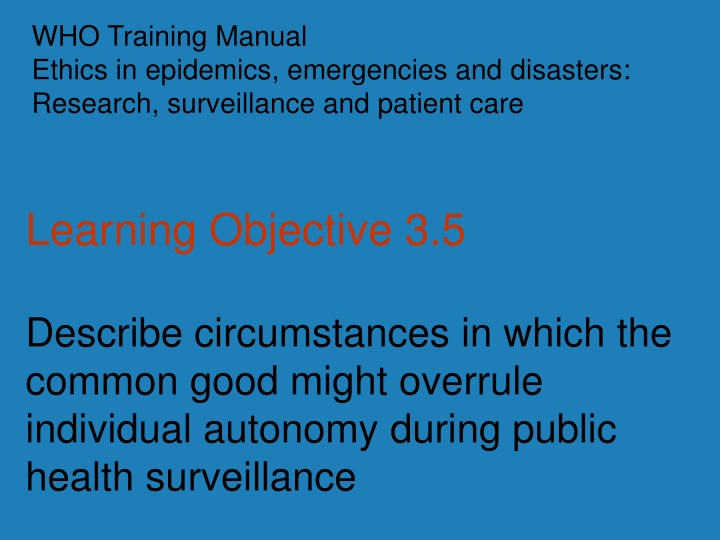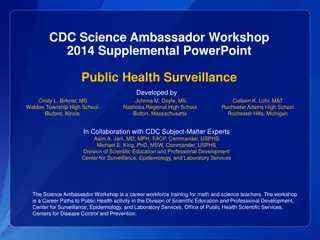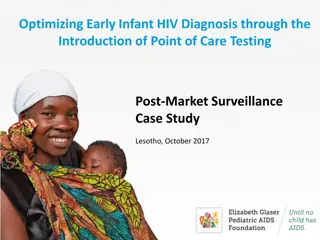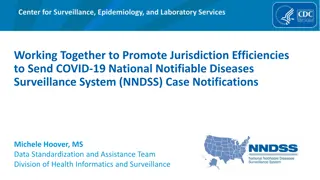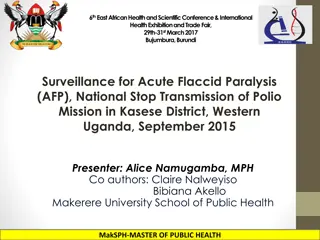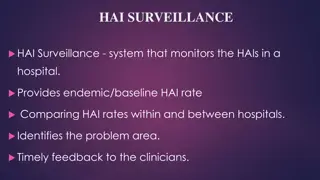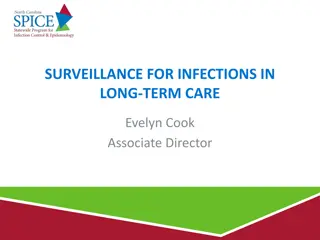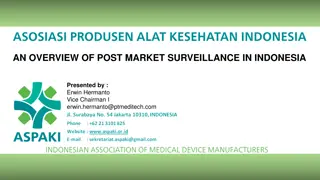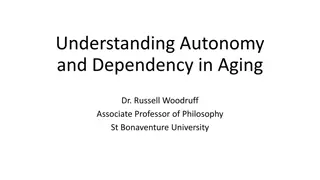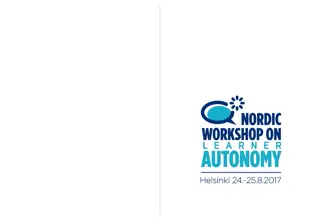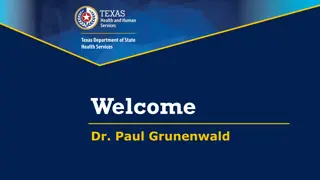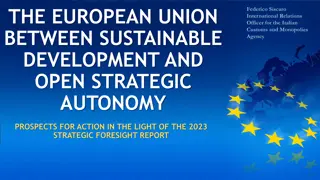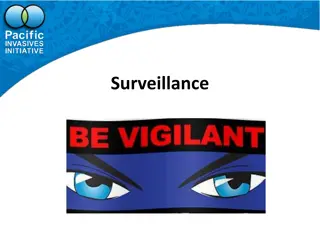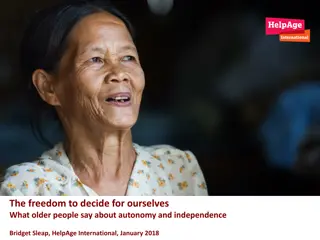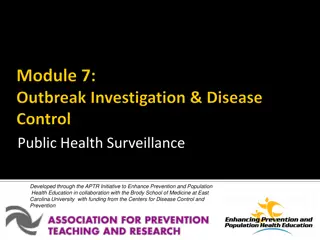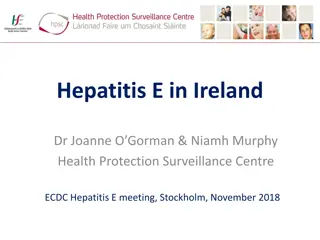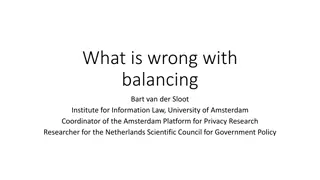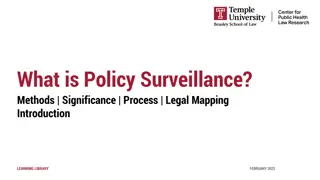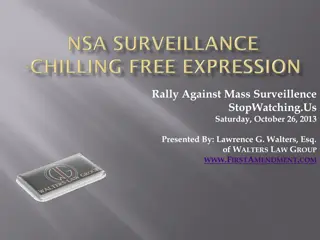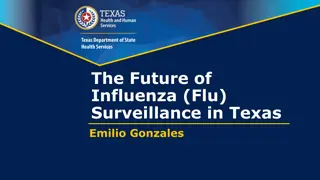Balancing Individual Autonomy and Public Health in Surveillance
Public health measures such as surveillance, notification, mandatory testing, and isolation may conflict with individual autonomy. Respecting autonomy is crucial for promoting well-being, but there are situations where overriding individual autonomy is necessary for the common good of society during public health surveillance.
Download Presentation

Please find below an Image/Link to download the presentation.
The content on the website is provided AS IS for your information and personal use only. It may not be sold, licensed, or shared on other websites without obtaining consent from the author.If you encounter any issues during the download, it is possible that the publisher has removed the file from their server.
You are allowed to download the files provided on this website for personal or commercial use, subject to the condition that they are used lawfully. All files are the property of their respective owners.
The content on the website is provided AS IS for your information and personal use only. It may not be sold, licensed, or shared on other websites without obtaining consent from the author.
E N D
Presentation Transcript
WHO Training Manual Ethics in epidemics, emergencies and disasters: Research, surveillance and patient care Learning Objective 3.5 Describe circumstances in which the common good might overrule individual autonomy during public health surveillance
Outline 1. Overview Public health measures Autonomy 2. Case study and discussion 3. Summary Suggested time 0-15 (15 min) 16-20 (5 min) 21-35 (15 min) 36-55 (20 min) 56-60 (5 min) Activity Introduction Reading Team preparation Team presentations and discussion Summary and conclusion L.O. 3.5
Public health measures Depending on the disease, the following measures could potentially be important for the protection of public health: Surveillance Notification of third parties and/or reporting to public health authorities Mandatory testing and/or treatment Isolation and/or quarantine L.O. 3.5
Public health measures Such measures could each involve interference with individual autonomy (and related basic human rights and liberties): Surveillance may interfere with privacy Notification of third parties and reporting to public health authorities may interfere with privacy Mandatory testing and/or treatment conflicts with the right to informed consent to medical intervention Isolation and/or quarantine conflicts with the right to freedom of movement L.O. 3.5
Why autonomy is important Individuals usually know what is best for them respecting autonomy thus usually promotes the well- being of individuals and the greater good of society As well as being instrumental in the promotion of an individual s well-being, autonomy is arguably itself a component of individual well-being Respecting autonomy is generally considered important to respecting persons (i.e. it is widely believed that persons should not be forced to do things for their own good). L.O. 3.5
Why autonomy is important But: What about cases where interference with an individual s autonomy is necessary to protect others and/or the greater good of society? L.O. 3.5
Right to autonomy It is generally believed that individual s have a right to autonomy. A right, by definition, is something that should (usually, anyway) be respected/protected even when the best overall consequences for society as a whole would be brought about through its violation (see Ronald Dworkin, Taking Rights Seriously) L.O. 3.5
Right to autonomy Rights (including the right to autonomy), on the other hand, are not usually considered absolute. In the case of emergencies, or when the threat to the overall good of society is great enough, rights (including the right to autonomy) may be outweighed by other considerations. If this is correct, then we need to strike a balance or make trade-offs between the aim to protect individual autonomy and the aim to promote the greater good of society. L.O. 3.5
For discussion But what would be a principled way for striking such a balance of making such trade offs? How great would a threat to society need to be for autonomy violation to be justified? Should the freedom to do immoral things count for less? L.O. 3.5
Case study John Jones was recently diagnosed with multi-drug resistant tuberculosis (MDR-TB). He was prescribed second-line medication (on an outpatient basis) and advised to follow standard infection control measures. Further studies of his TB isolates revealed that the strain of TB he is infected with is possibly (and perhaps likely) a rare and newly emerged new strain of extensively drug-resistant tuberculosis (XDR-TB) that is especially virulent and contagious. Upon this discovery, the public health authorities decided that John Jones should be isolated for further analysis, observation and treatment. L.O. 3.5
Case study When they tried to contact/locate him, however, they were unable to do so. Based on their previous interactions with him, they had reason to believe that he was afraid of the possibility of isolation (he repeatedly said I don't want to be locked up... please don't lock me up! ) and that he thus might have gone into hiding. After it has remained impossible to locate him for one week, it has been proposed that his name and photograph should be provided to major media outlets (e.g., newspapers, and television news providers) and that a public warning should be issued (with instructions to notify the authorities if he is seen anywhere). L.O. 3.5
Questions for Discussion 1. Should John Jones s name and photograph be made public? 2. How else might this case be managed? 3. Some might argue that John Jones actions are immoral and that it is thus less problematic to infringe upon his privacy/autonomy. Assuming he actually has gone into hiding, would that be immoral? Is the morality of his action relevant to the question of whether or not his privacy/autonomy could permissibly be infringed under the circumstances? 4. Suppose that before a decision is made about whether to publish his picture, further analysis reveals that others previously infected with the same strain usually infected one other person each month on average. Would this make publishing his photo more or less justifiable? What if it was only one person every two months, or every six months, or one year? What would the average rate of infection of others need to be in order for it to be permissible to publish his photograph? 5. If John Jones is eventually located, for how long (if at all) would it be ethically permissible to forcibly isolate him? L.O. 3.5
Summary Public health measures required to promote and protect the greater good of society sometimes interfere with basic human rights and liberties (autonomy in particular) The right to autonomy is not absolute and it must be balances against other legitimate societal values, such as population health. Autonomy-violating coercive measures are arguably most justifiable when a) public health stakes are high b) individuals are coerced into things that are considered to be moral duties c) coercion benefits those coerced and the society as a whole. L.O. 3.5
Sources Dworkin R. Taking Rights seriously. London: 1977. L.O. 3.5
Acknowledgements Chapter author Selgelid, Michael J., Centre for Human Bioethics, Monash University, Clayton, Victoria, Australia L.O. 3.5
